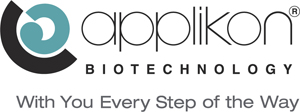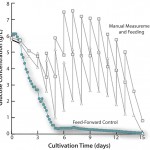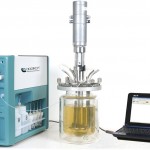 Cell culture is widely used for stable expression of monoclonal antibodies with posttranslational modifications. Despite having a stable cell line, a protein product is still in danger of improper modifications from chemical interactions with media. For example, the primary amino groups on a protein are susceptible to reactions with reducing sugar molecules. In the case of a reaction with glucose, this is called
Cell culture is widely used for stable expression of monoclonal antibodies with posttranslational modifications. Despite having a stable cell line, a protein product is still in danger of improper modifications from chemical interactions with media. For example, the primary amino groups on a protein are susceptible to reactions with reducing sugar molecules. In the case of a reaction with glucose, this is called
glycation. The relationship between glucose concentration and glycation is explored here.
Methods:

FIGURE 1: Glucose measurements from three fed-batch runs. Run 1 (square) and run 2 (triangle) were fed once daily. Run 3 (circle) was fed continuously
Chinese hamster ovary (CHO) cells were grown in fed-batch mode in a 2-L glass bioreactor. Offline glucose measurements were obtained using a YSI 7100 system with glucose membrane and two-point calibration. Online measurements were obtained with Biosenz analyzer, with glucose sensor and automated four-point calibration. Glycation of proteins was determined using ESI-TOF analysis.
Results:
Two runs proceeded with daily bolus feed of glucose. Manual samples before and after the feed were analyzed for glucose concentration. In run 1, 17% glycation was obtained. In run 2, where the glucose concentration was lower than run 1, glycation was 10%. To further explore the effect of keeping the glucose concentration low, run 3 was performed with feed-forward glucose additions and automated online monitoring of the glucose concentration. Using this strategy, glucose was maintained <1g/L. By preventing the higher glucose concentration that resulted from bolus feeding, glycation was eliminated in run 3.
Conclusions:
Automated measurement of glucose at frequent intervals using the Biosenz analyzer enables safe operation at lowered glucose concentrations. When glucose was maintained <1g/L, glycation was eliminated without decreasing productivity or yield.
Data were obtained courtesy of Genmab (Utrecht, NL).
Reference
1. Yuk, IH. Controlling Glycation of Recombinant Antibody in Fed-Batch Cell Culture. Biotechnol. Bioeng. 2011: 108(11) 2600-2610.
Ann D’Ambruoso
is product manager, small-scale technologies, 1180 Chess Dr Foster City, CA; 1-650-578-1396;
info@applikonbio.com; www.applikonbio.com.

